The European energy crisis has held the continent in its icy grip for a while now, ever since Russia’s war with Ukraine left the EU energy circles shivering like an unprepared camper in a sudden snowstorm. With Russia’s gas supply accounting for a whopping 41% of the EU’s gas imports, Brussel’s sanctions on Russian energy worsened the scene.
In the face of this turmoil, some European nations might as well have been caught in headlights, paralyzed by the enormity of the crisis. Not Greece, though. While others were fumbling for their mittens, Greece was rolling up its sleeves and taking charge.
With strategic vision and a remarkable audacity, Greece set out on a mission to shore up Europe’s energy security and truly became the David against the Goliath of energy uncertainty.
Commission President Ursula von der Leyen’s emergency plan, REPowerEU, was meant to be the knight in shining armor for the 2022-2023 winter. Yet, as Europe peered into the post-winter gloom, it’s evident that the knight must have taken a wrong turn somewhere.
Greece’s Rise as Energy
Meanwhile, while others stumbled, Greece sprinted ahead. Recognizing the need for diverse and reliable energy sources, Greece looked eastward for solutions. The East Mediterranean Gas Pipeline might have seemed a Herculean task, but Greece was undeterred.
Instead, Athens dived into projects of regional and European significance, such as the Euro Asia Interconnector. This trailblazing project links the power grids of Israel, Cyprus, and Greece with the European grid, offering up to 2000 megawatts of energy to fuel Europe’s progress.
Nexans, a key player in energy transformation, must have seen Greece’s determination from miles away, as they snatched a $1.6 billion contract for a section of the Euro Asia Interconnector. This subsea cable will snake its way through ultra-deep waters.
But that’s not all. Greece’s energy prowess isn’t confined to cables and connectors. No, it’s more versatile than a Swiss army knife. An onshore 28-kilometer gas transmission pipeline? Check.
Connecting the National Gas Transmission System to the Alexandroupolis Floating Storage and Regasification Unit, this pipeline is like a superhighway of energy, pumping 5.5 billion cubic meters of gas annually to the Balkans and Southeast Europe.
Read More: Saudi Arabia’s secret deal with Greece
The Gas Boom
Greece’s energy fervor doesn’t stop at gas. The construction of a 160-kilometer gas pipeline in western Macedonia, ready to transport up to a dazzling 100% hydrogen, marks the country as a trailblazer in the European Hydrogen backbone project.
Greece’s commitment to clean energy echoes louder than a Greek chorus, harmonizing progress, and sustainability. Greece’s hydrocarbon exploration isn’t just talk either. The Greek government has laid out an action plan that could easily have been scripted by Indiana Jones himself.
Seismic surveys and drilling in the Ionian Sea and south of Crete are set to uncover treasures of recoverable gas, with estimates ranging between 2 and 2.55 trillion cubic meters. Greece is a true energy, Indiana Jones, uncovering treasures hidden beneath the waves.
This energy journey isn’t just about Greece; it’s a tune the entire EU can hum along to. Greece’s efforts are a testament to the power of proactive thinking, strategic investment, and the audacity to dream big in the face of adversity.
Read More: Germany is the New Greece
While the European energy crisis might have dimmed the lights, Greece’s energy brilliance is helping illuminate a path toward a brighter, more secure future.
So, while some European nations fumble around in the dark, Greece is already flipping switches, connecting dots, and building bridges to a resilient, diverse, and secure energy landscape. It’s high time we shine the spotlight on Greece’s energy odyssey because, let’s face it, when it comes to energy solutions, Greece is the Herculean hero Europe didn’t know it needed.
Watch More:
